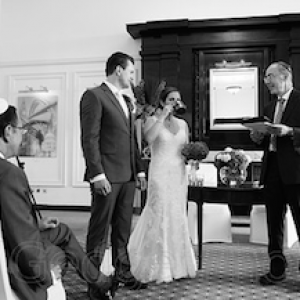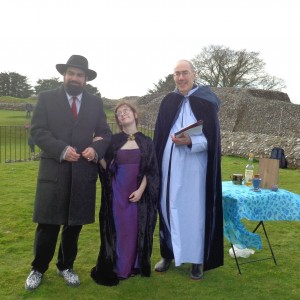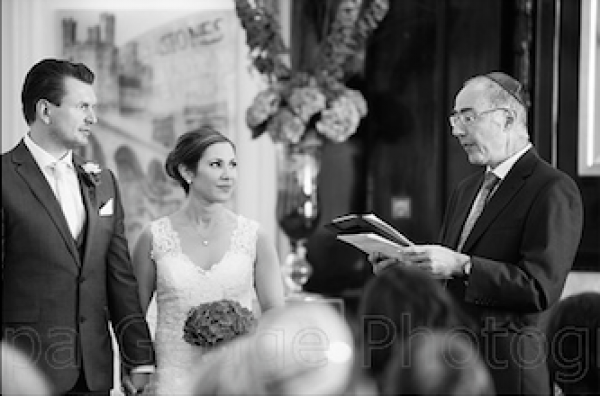
by Michael | Apr 12, 2016 | Blog
As a civil celebrant, I note that mixed marriage has become increasingly common nowadays. It may be between couples whose beliefs encompass different strands of the same religion (eg Anglican and Roman Catholic) or believers of totally different faiths (I was recently honoured to be asked to perform a ceremony for a Jewess marrying a Muslim).

Source: Philippa Gedge photography
And then there are even less conventional combinations (in the picture below, I conducted a pagan handfasting, incorporating a number of Jewish elements).

Problems
On one occasion, I had been booked to conduct a ceremony for a practising (Reform) Jew and a practising Anglican. I was to be working together with a Reverend to create the appropriate service for the pair. Unfortunately, one set of grandparents were strict Jews and threatened to boycott the ceremony, unless an ordained rabbi (which I am not) led that part of the wedding.
It was certainly a dilemma for the couple.
Decisions
Who was in the right? Should the couple not be allowed to do what they want and believe in? Especially on their big day. Or should they respect and please family?
Of course, there is no doubt what my feelings about the matter are. However, there are two sides to any argument.
On the one hand …
As both of them actively follow their own religion, they do need to seriously consider how they will bring up any eventual children up. Circumcision may be just one of the decisions they will have to agree on. What about religion school, if any?
Once they have dealt with such problems, there are still those grandparents to contend with. The pair won’t choose to offend them, naturally. They should show respect. But whose wishes should actually prevail?
… on the other
Surely this has got to be the couple’s (joint) decision? They are adults and It is their lives, after all. They certainly won’t want to be insincere and uncomfortable on arguably the biggest day of their lives.
If reasoning with objectors doesn’t work, it might be possible to compromise (though difficult to do in this circumstance) or make it up with them in some way. Maybe invite them to participate or assure them that you will spend festivals like Passover together with them, and that you want them to play a full part in the life of any offspring.
It may even be that the ceremony is so sincere and beautiful that the objectors come round of their own accord.
Wouldn’t that be something?
Please contact me for a (non-obligation) chat, if you are contemplating a mixed marriage (or if anyone you know is) .

by Michael | Nov 30, 2015 | Blog
Mixed marriage is very common these days.
Not everybody can – or wants to – marry in a religious institution. Catholics will not allow divorcees to marry in church; same-sex ceremonies are not permissible in many churches; Christians and Jews, for example, can’t be married in either church or synagogue.
 Photos: Philippa Gedge Photography
Photos: Philippa Gedge Photography
Of course, Register Offices offer an alternative (for any marriage, a registrar must always be involved to cover the legal requirements), but their services are standardised and limited (though they will suit some people fine, of course). These services must be totally non-religious. Which means that they often do not meet the needs or wishes of the couple or their families. That’s where the (non-humanist) civil celebrant can come in.
The civil celebrant will work with the couple to design the service that fits in with their beliefs. So it may be religious, part-religious or totally secular. It may contain rituals from a variety of religions and/or cultures.
The service will also be exactly as the couple want. So it is up to them what clothes will – or will not – be worn (I have been asked if I’d do a naturist wedding!). The couple can choose readings or poems, and also readers. There can be an address by the celebrant – checked in advance by the couple. They can have the choreography that they want, including the music. In short, absolutely everything can be approved by the couple before the day.
Logistically, there are a couple of decisions to be made.
- Should the register office ceremony take place a few hours – or a day or two – in advance? That way, the legal bit is covered by the time the couple come to the ‘real’ wedding ceremony, and they can relax and really enjoy their bespoke ceremony.
- Should the civil ceremony or blessing come straight after the legal marriage (at the same venue)? The ring blessing, for example, could be done by the civil celebrant, as could the vows. This way, the registrars could conduct a 10-15 minute ceremony, and the blessing ceremony could take around as long (depending).
The important thing on such a big day is to enjoy a memorable, meaningful ceremony – one which the couple and their guests will remember fondly for months and years to come. By creating a personalised service and conducting it professionally, a good civil celebrant will ensure this.
by Michael | Jun 30, 2015 | Blog
A Muslim marrying a Jewess – that doesn’t happen every day!
Tempting as it is to devote this blog to a discussion of inter-racial or inter-religious harmony, that’s not really my subject, wonderful as it might be.
Mixed marriages are more up my professional street, though.
Be that as it may, I was delighted to contribute (in a tiny way) to this utopian ideal by conducting a wedding blessing very recently at a mixed marriage. It was, indeed, the union of Muslim and Jewess.
Neither one of the couple was religious, in fact. The Muslim wanted no part in any religious ceremony (although he did agree to participate in our blessing, as long as he didn’t have to say anything); the Jewess agreed to it mostly to satisfy her parents.
I had worked with M.’s mother (although M. was given the opportunity to ask for amendments etc.) to create a suitable blessing ceremony. Essentially, it would consist of a number of blessings in English (a few in Hebrew), the traditional “Seven Blessings” in both languages, and some wine. Thus, a mix of traditional and modern.
On the day, I sought out the groom, who, not unreasonably, was a bit nervous about the whole event, and put him at ease. We had a chat, and I told him what was going to happen, and that he didn’t need to worry about anything.
After the legal marriage (which took place in the same hall), I took over. I threw in a couple of impromptu little jokes at the start, so the couple could feel more comfortable, and made a few guests smile with my introductory remarks.
I then went through the blessings, as agreed, but what was nice was how the groom visibly relaxed – even to the extent of cracking a joke himself when it came to the wine!
The blessing ceremony only lasted 10 minutes, at most, but it was obviously appreciated and I felt very pleased, though humble too, because of the role I had been able to play in the union of two lovely people of potentially clashing cultures.
May they be a beacon for others – and may they find true happiness!




